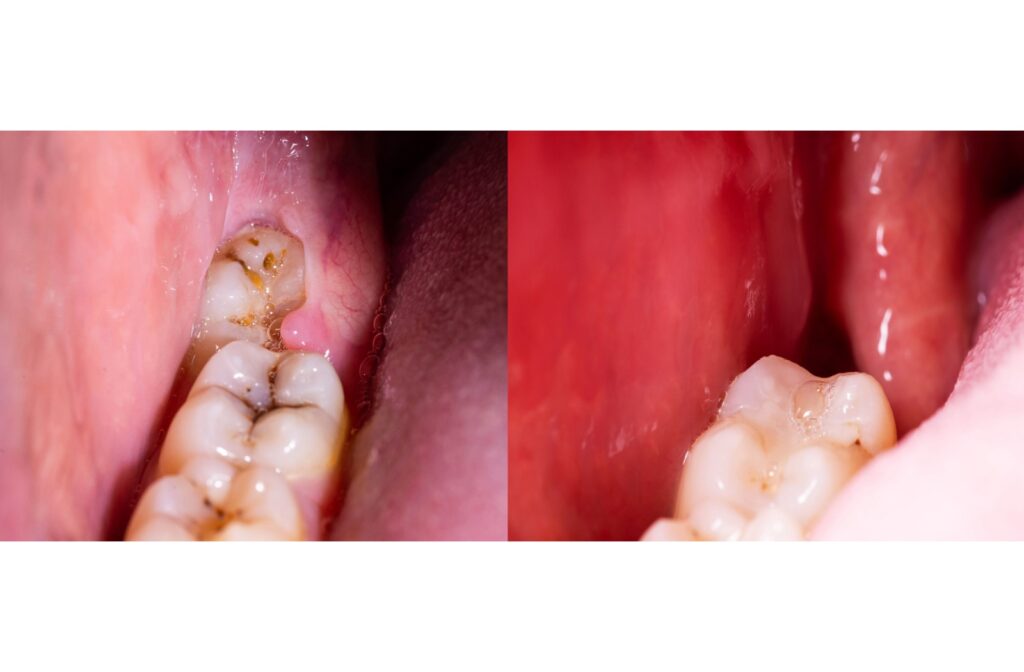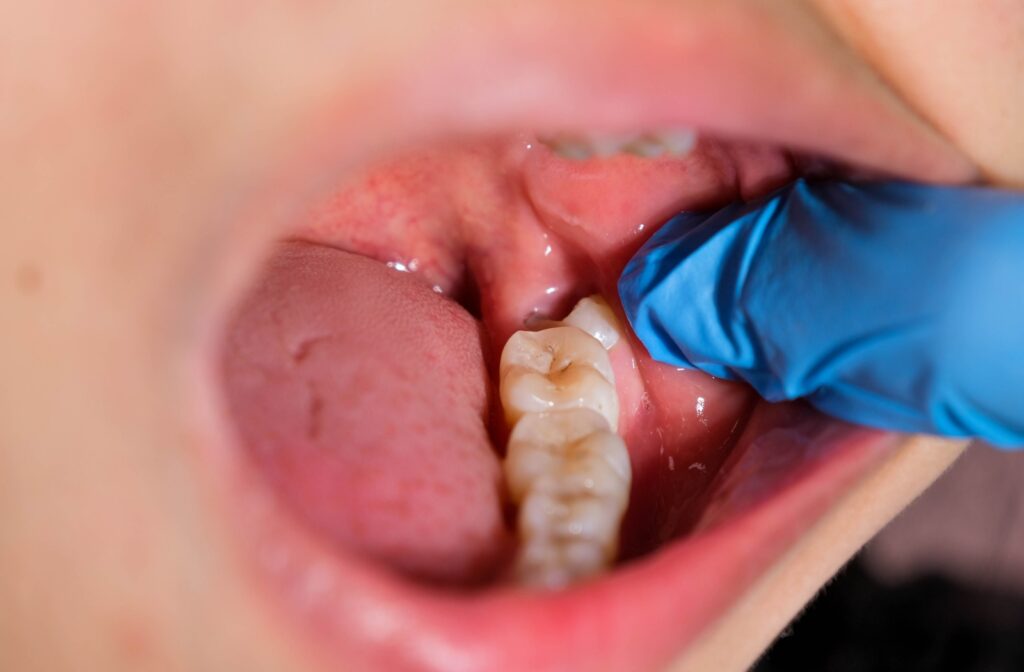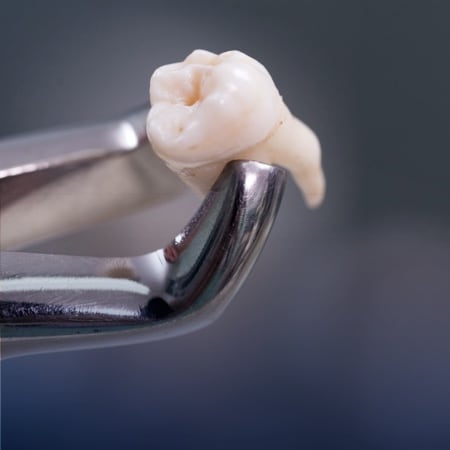Not everyone needs their wisdom teeth removed, but how do you know if you’re one of the people who does? While some wisdom teeth come in without causing problems, others create pain, infection, and damage to neighboring teeth. Understanding the warning signs helps you get treatment before a minor issue becomes a dental emergency.
Common signs you need wisdom tooth removal include persistent pain in your jaw, swollen gums around your back teeth, difficulty opening your mouth, bad breath that won’t go away, & teeth shifting out of their normal positions.
Your oral surgeon can evaluate these symptoms and determine whether extraction is necessary. But first, it’s worth understanding when wisdom teeth can actually stay.
When Your Wisdom Teeth Can Stay
Not everyone needs these teeth extracted if they meet certain conditions. Understanding the criteria for wisdom tooth extraction helps you make informed decisions about your oral health.
- Positioned correctly & biting properly with opposite teeth
- Healthy with no decay or infection
- Fully erupted through the gums
- Easy to clean during daily oral hygiene
Physical Pain & Discomfort Signs
Pain in Your Mouth & Jaw
Wisdom tooth pain often starts as mild discomfort & gradually becomes more intense. You might notice the pain comes & goes at first, then becomes constant. If you’re wondering how to identify wisdom tooth infections, persistent pain is often one of the first indicators.
- Throbbing sensation in the back of your mouth
- Jaw stiffness or difficulty opening your mouth
- Headaches that seem connected to your teeth
- Sharp pain when chewing or biting
Why Wisdom Teeth Require an Oral Surgeon
Your CVOS oral surgeon in Mississauga completes years of additional hospital-based training beyond dental school, specializing in complex surgical procedures that general dentists refer out. Oral and maxillofacial surgeons focus specifically on surgical treatment of the mouth, jaw, and face, giving them expertise that goes far beyond routine dental care.
This specialized education means they can safely handle complicated wisdom tooth cases, including impacted teeth or those close to nerves. Your oral surgeon also uses advanced surgical techniques and sedation options to make your procedure more comfortable and precise.
Visible Gum & Tooth Problems
Gum Inflammation & Swelling
Swollen gums around your wisdom teeth often signal that these teeth don’t have enough room to emerge properly. The inflammation can make eating & brushing uncomfortable. Understanding proper gum health helps you recognize when wisdom teeth are causing problems.
- Red, swollen areas along your gum line
- Tender spots that hurt when touched
- Bleeding gums around your back teeth
- Flaps of gum tissue covering partially erupted teeth
Crowding & Alignment Issues
Wisdom teeth can push against your other teeth as they try to emerge. This pressure can undo years of orthodontic work or create new alignment problems.
- Your other teeth shifting out of place
- Previously straight teeth becoming crooked
- Difficulty fitting your teeth together properly
Infection & Hygiene Warning Signs
Bad Breath & Taste Problems
When wisdom teeth are hard to reach with your toothbrush, bacteria can build up in those areas. This creates persistent odours & unpleasant tastes that regular brushing can’t eliminate. Learning about bad breath causes can help you understand the connection to wisdom teeth problems.
Things to look out for:
- Persistent bad breath despite good oral hygiene
- Unpleasant metallic or bitter taste in your mouth
- Food getting trapped behind your back teeth
Signs of Developing Infection
Infections around wisdom teeth can develop quickly & may require immediate attention. These symptoms indicate bacteria have entered the surrounding tissue:
- Facial swelling on one or both sides
- Difficulty swallowing or opening your mouth
- Fever accompanying mouth pain
- Pus or discharge around your wisdom teeth

Hidden Complications You Might Not Notice
Impacted Wisdom Teeth Problems
Your oral surgeon can detect these issues during routine X-rays before they cause obvious symptoms. Impacted teeth remain trapped beneath your gums or in your jawbone. Professional dental X-ray imaging helps identify hidden problems early, such as:
- Cysts forming around impacted teeth
- Damage to neighbouring tooth roots
- Bone loss in your jaw
Can a Wisdom Tooth Cause Ear Pain?
Pain from wisdom teeth can radiate to your ears, making it feel like an ear infection when the problem is actually in your mouth. The nerves in your jaw connect to the same pathways that serve your ears.
If you have ear pain along with any mouth discomfort, your oral surgeon can help determine if your wisdom teeth are the source of both problems.
Age & Timing Considerations
What Age Is Too Late to Remove Wisdom Teeth?
While removal is easier when you’re younger, your oral surgeon can safely extract wisdom teeth at any age when necessary. Many adults have successful extractions in their 40s, 50s, & beyond.
The main difference is that older patients may need a bit more time to heal. Your oral surgeon can explain what to expect based on your specific situation.
Why Earlier Removal Is Often Easier
Younger patients typically have an easier time with wisdom tooth extraction for several reasons. The procedure itself tends to be less complicated when done earlier. Understanding wisdom teeth recovery helps you plan appropriately.
- Tooth roots aren’t fully developed yet
- Bone is less dense in younger patients
- Recovery tends to be faster
- Fewer complications during healing
When to Contact Your Oral Surgeon
Don’t Wait for Severe Symptoms
You don’t need to endure significant pain before seeking help. Early intervention often means easier treatment & quicker recovery. Learning how to prevent complications starts with timely professional care.
Your oral surgeon can evaluate your wisdom teeth & recommend the right approach for your situation. Many problems are easier to address before they become painful or infected.
Get Ahead of Wisdom Tooth Problems
Your dentist monitors wisdom tooth development through routine check-ups and can refer you to an oral surgeon when removal becomes necessary. This proactive approach helps you avoid emergency situations and allows for planned treatment at the optimal time. Regular dental examinations play a crucial role in catching wisdom tooth problems early.If you’re experiencing any of these warning signs, ask your dentist for a referral to CVOS Oral Surgery. Our team can help you understand your options and create a comfortable treatment plan. Don’t hesitate to request a referral—taking action early can prevent more serious complications down the road.










